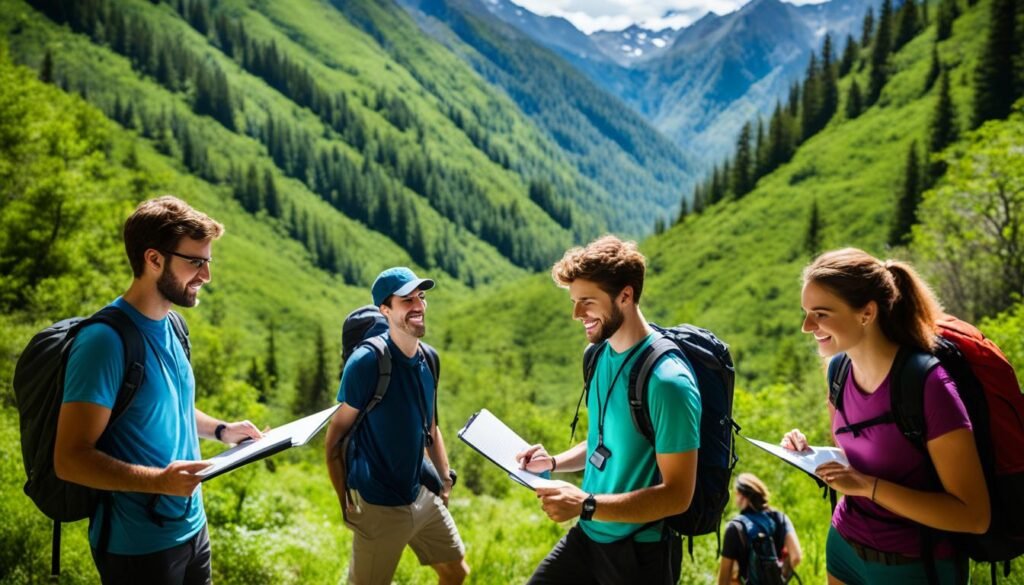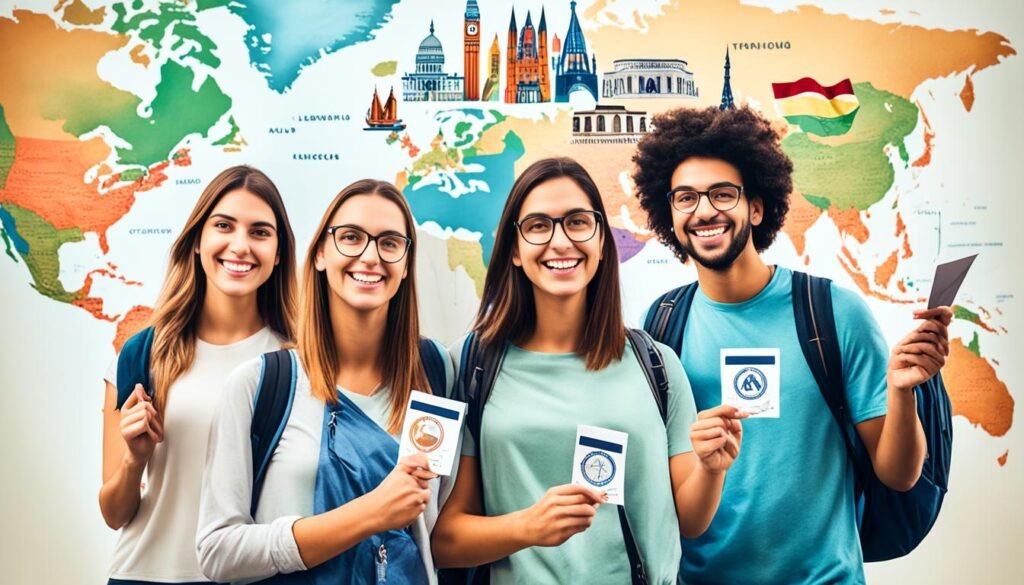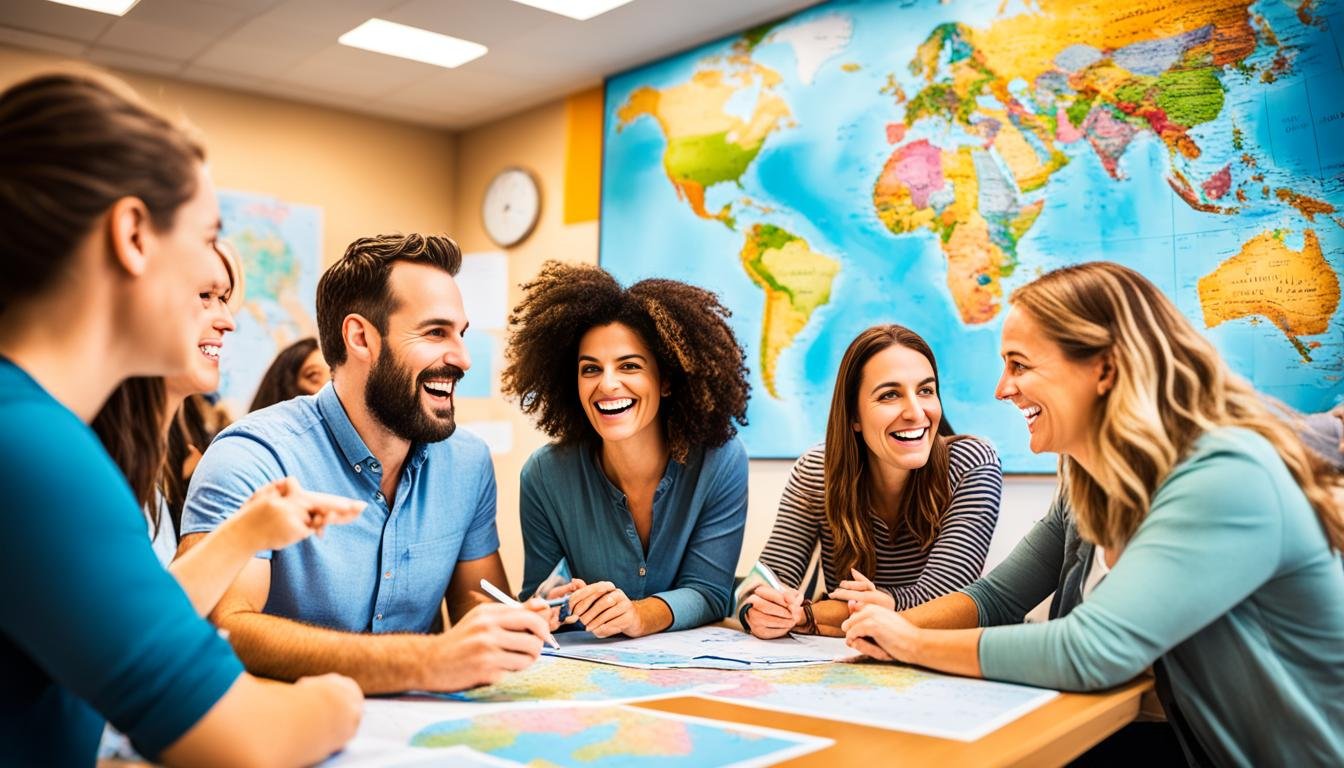In today’s rapidly evolving world, learning no longer confines us to the traditional classroom setting. Educational travel has emerged as a powerful tool that allows individuals to explore the world and embark on transformative learning journeys. By venturing beyond textbooks and lecture halls, we can gain knowledge, skills, and experiences that shape us into well-rounded global citizens.
Educational travel encompasses a wide range of experiences, from study abroad programs and cultural immersion trips to academic travel and educational tours. These journeys provide opportunities to learn about different cultures, histories, and environments, enabling us to develop a deeper understanding of the world and our place in it. Through hands-on experiences and real-world learning, we can broaden our perspectives, enhance critical thinking skills, and foster personal growth.
Join us as we delve into the rise of educational travel and explore the transformative impact it has on our learning and personal development. Discover how educational travel is shaping the next generation of global citizens and paving the way for a future of lifelong learners.
Key Takeaways:
- Educational travel allows individuals to learn outside of traditional classroom settings, exploring the world as a classroom.
- Through educational travel, individuals can gain knowledge, skills, and experiences that shape them into well-rounded global citizens.
- Hands-on experiences and real-world learning offered by educational travel enhance critical thinking skills and foster personal growth.
- Educational travel encompasses various experiences, including study abroad programs, cultural immersion trips, academic travel, and educational tours.
- Educational travel plays a crucial role in shaping the next generation of global citizens and promoting a lifelong love of learning.
Educational Travel and Learning Journeys: A Global Movement
In today’s rapidly evolving educational landscape, educational travel and learning journeys have emerged as a global movement. This section will delve into the concept of educational travel, exploring the shift towards experiential learning, the impact of technology on global education experiences, and the undeniable benefits of real-world learning environments.
The Shift Towards Experiential Learning
Traditional classroom learning often limits students to textbooks and lectures, offering limited opportunities for hands-on engagement. However, educational travel introduces a shift towards experiential learning, where students actively immerse themselves in real-world environments to gain practical knowledge and skills. Instead of merely reading about different cultures, historical events, or scientific phenomena, students have the chance to experience them firsthand.
Experiential learning encourages students to observe, analyze, and reflect on their experiences, fostering critical thinking, problem-solving, and creativity. By engaging with their surroundings, students develop a deeper understanding of the subject matter, as they connect theoretical knowledge with real-world applications. Whether it’s exploring ancient ruins, conducting scientific experiments, or interacting with local communities, experiential learning fosters a deeper level of engagement and personal growth.
Global Education Experiences in the Digital Age
In the digital age, technology has revolutionized global education experiences, making them more accessible and interactive than ever before. Virtual reality, online platforms, and digital resources now provide students with the opportunity to explore the world and learn about different cultures, languages, and environments from the comfort of their classrooms.
Technology-enabled learning experiences bridge the gap between continents, allowing students to connect with experts, participate in virtual field trips, and access a vast array of educational resources. Virtual reality simulations can transport students to historical landmarks, natural wonders, and even outer space, providing a level of immersion and interactivity that was previously unimaginable.
Moreover, digital platforms facilitate communication and collaboration among students from around the globe, fostering cross-cultural understanding and expanding perspectives. Through online forums, videoconferences, and collaborative projects, students can engage with peers from different backgrounds and gain a deeper appreciation for diversity and global interconnectedness.
Benefits of Real-World Learning Environments
Learning in real-world environments offers a multitude of benefits that extend beyond academic achievement. By stepping outside the classroom and immersing themselves in different cultures and environments, students develop a range of valuable skills and qualities that are essential for success in today’s interconnected world.
- Critical thinking skills: Real-world learning environments encourage students to think critically and apply their knowledge in practical situations. By navigating unfamiliar settings, solving problems, and analyzing complex issues, students sharpen their analytical and problem-solving abilities.
- Cultural understanding: Interacting with diverse cultures fosters cultural sensitivity and empathy. Students develop a deeper appreciation for different perspectives, traditions, and ways of life, promoting a greater sense of global citizenship.
- Personal growth: Real-world learning environments challenge students to step out of their comfort zones, building resilience, adaptability, and self-confidence. They gain a heightened sense of independence and self-awareness, cultivating important life skills for personal and professional development.
By embracing educational travel and learning journeys, students embark on transformative experiences that broaden their horizons, deepen their understanding of the world, and prepare them to navigate an increasingly interconnected global landscape.
Understanding World Schooling: Education Without Boundaries
World schooling is a form of alternative education where children are taught primarily through experience and travel. It is a unique approach that breaks free from the confines of traditional classrooms and embraces the world as a vast learning environment. Through world schooling, children have the opportunity to explore different cultures, religions, and histories firsthand by immersing themselves in various locations, museums, and tours.
World schooling is based on the belief that education should not be limited to textbooks and lectures, but rather be an interactive and holistic experience. It encourages children to learn through real-life encounters, fostering a deeper understanding and appreciation of the world around them. By engaging with different environments, children develop valuable skills such as adaptability, cultural sensitivity, and critical thinking.
Digital learning platforms and homeschooling have played significant roles in making world schooling more accessible and popular. With the advancement of technology, children can now access a wealth of educational resources online, allowing them to continue their learning journey even while on the go. Homeschooling provides the flexibility for families to create personalized curricula and travel plans that align with their educational goals.
World schooling, however, comes with its own set of challenges. It requires careful planning and coordination to ensure a well-rounded education. Parents need to strike a balance between allowing their children to explore freely and providing structure to their learning experiences. They must also consider practical aspects such as academic requirements, social interactions, and finding opportunities for learning in various destinations.
In conclusion, understanding world schooling is to recognize the immense potential of learning beyond the walls of a traditional classroom. It opens up a world of endless possibilities, enabling children to acquire knowledge, skills, and experiences that shape them into well-rounded global citizens. Through world schooling, education knows no boundaries, and the journey becomes as educational as the destination.
Bridging Technology and Travel: eLearning on the Go
In today’s interconnected world, technology has become an integral part of our daily lives, shaping various aspects, including education and travel. The impact of digital education on traditional learning methods has been significant, revolutionizing the way we acquire knowledge and skills. The emergence of eLearning platforms has further transformed the educational landscape, enabling individuals to embark on educational excursions while utilizing the power of technology.
The Impact of Digital Education on Traditional Learning
The rise of digital education has reshaped traditional learning methodologies, offering new possibilities for students of all ages. The integration of technology in the classroom has enhanced accessibility, flexibility, and interactivity, providing individuals with personalized learning experiences. Through online courses, virtual classrooms, and multimedia resources, students can engage with educational content anytime and anywhere, transcending the limitations of physical classrooms.
Furthermore, digital education has expanded educational opportunities for learners who may face geographical, financial, or time constraints. It has bridged the gap between students and reputable educational institutions, allowing individuals to access quality education from renowned universities and experts around the world. This democratization of education has empowered learners, enabling them to pursue their academic and professional goals without geographical limitations.
Moreover, digital education has fostered self-paced learning, allowing students to tailor their educational journey according to their individual needs and preferences. It has encouraged autonomous learning and critical thinking, equipping learners with the necessary digital literacy skills for success in the digital age. By embracing technology in education, traditional learning methods have evolved to accommodate the diverse learning styles and preferences of today’s students.
eLearning Platforms Enabling Educational Excursions
In recent years, eLearning platforms have innovatively combined technology and travel, offering unique opportunities for educational excursions. These platforms leverage digital resources, immersive multimedia, and interactive learning tools to create engaging educational content centered around specific travel destinations and themes.
eLearning platforms enable individuals to embark on virtual educational excursions, where they can explore different cultures, historical landmarks, natural wonders, and artistic masterpieces. Through virtual guided tours, interactive maps, and engaging multimedia content, learners can immerse themselves in educational experiences that bring the world to their fingertips.
These platforms also facilitate real-world educational excursions by providing comprehensive itineraries, resources, and digital guides to enhance the learning experience on-site. Individuals can access relevant information about the destination, historical context, local customs, and points of interest, ensuring a curated and educational travel experience.
By integrating eLearning platforms with educational excursions, learners can combine the benefits of digital education with the enriching experiences gained through travel. They can expand their knowledge, broaden their horizons, and develop a deeper understanding of different cultures and environments, ultimately becoming well-rounded global citizens.
| Benefits of eLearning in Education | Benefits of Educational Excursions |
|---|---|
|
|
The Evolution of Study Abroad Programs
Study abroad programs have long been a popular form of educational travel. Over the years, these programs have evolved to provide students with unique opportunities to expand their educational horizons and gain invaluable experiences.
Originally, study abroad programs were primarily focused on language immersion and cultural exchange. Students would spend a semester or an academic year in a foreign country, living with a host family and attending classes at a local university. These programs allowed students to improve their language skills, immerse themselves in a different culture, and gain a global perspective.
However, as the world became increasingly interconnected, study abroad programs started to offer a wider range of academic disciplines and destinations. Today, students can choose from a variety of study abroad options, including semester programs, short-term courses, internships, and research opportunities.
The growth of study abroad programs can be attributed to several factors. Firstly, the recognition of the importance of global competence and intercultural skills in the workforce has led to an increased demand for study abroad experiences. Employers value individuals who have the ability to navigate different cultures and work in diverse teams.
Secondly, advancements in technology and transportation have made study abroad programs more accessible. Students can now easily connect with universities and organizations around the world, find information about programs, and apply online. Additionally, affordable air travel has made it easier for students to reach their destinations.
Lastly, universities and colleges have recognized the value of study abroad programs in enhancing students’ academic and personal growth. Many institutions have established partnerships with universities abroad, allowing for seamless credit transfer and ensuring that students’ study abroad experiences are integrated into their degree programs.
Studying abroad offers numerous benefits to students. It allows them to develop cross-cultural communication skills, enhance their language proficiency, and gain a deeper understanding of global issues. Students also have the opportunity to build a global network of friends and professionals, which can be valuable for future career opportunities.
As study abroad programs continue to evolve, it is crucial for educators and institutions to provide support and guidance to students throughout their experiences. By preparing students before they embark on their study abroad journeys, offering cultural competency workshops, and providing resources for reflection and integration upon their return, institutions can ensure that study abroad programs have a lasting impact on students’ academic and personal growth.
“Studying abroad was one of the most transformative experiences of my life. It opened my eyes to different cultures, expanded my worldview, and gave me the confidence to navigate new environments. I am forever grateful for the opportunity to study abroad.”
—Jessica Thompson, Study Abroad alumna
As study abroad programs continue to evolve, they will play an essential role in preparing the next generation of global citizens with the skills and experiences necessary to thrive in an increasingly interconnected world.
Academic Travel Opportunities Beyond the Classroom
Academic travel provides students with unique opportunities to expand their learning beyond the confines of traditional classrooms. Through hands-on learning experiences and academic excursions, students can deepen their understanding of subjects and gain valuable real-world knowledge. Academic travel allows students to explore different cultures, environments, and perspectives, fostering a well-rounded and holistic approach to education.
Hands-On Learning Through Academic Excursions
One of the key benefits of academic travel is the opportunity for hands-on learning through academic excursions. Instead of solely relying on textbooks and lectures, students have the chance to immerse themselves in practical experiences that bring their studies to life. Whether it’s conducting field research, visiting historical sites, or engaging with local communities, academic excursions provide a rich and immersive learning environment that enhances students’ understanding and stimulates their curiosity.
Through academic excursions, students can witness firsthand the application of theoretical knowledge in real-world contexts. They can observe the intricacies of different cultures, ecosystems, or industries, which may be difficult to grasp solely through classroom-based learning. By actively participating in educational activities outside the classroom, students develop critical thinking skills, problem-solving abilities, and a deeper appreciation for the subject matter.
Academic Travel vs. Traditional Study Methods
When comparing academic travel to traditional study methods, it becomes clear that academic travel offers distinct advantages in terms of experiential learning and cultural immersion. While traditional study methods, such as lectures and readings, provide a solid foundation of knowledge, academic travel takes learning a step further by providing direct exposure to new environments and perspectives.
By immersing themselves in different cultures, students gain a broader understanding of global issues, develop cultural competence, and enhance their communication skills. Experiencing different ways of life, customs, and traditions firsthand fosters empathy, tolerance, and respect for diversity. These are invaluable skills that cannot be easily replicated in a traditional classroom setting.
Moreover, academic travel enables students to apply their knowledge in practical, real-life situations, bridging the gap between theory and practice. This experiential approach facilitates a deeper understanding of the subject matter and promotes critical thinking, problem-solving, and creativity.
Overall, academic travel provides students with a transformative learning experience that goes beyond textbooks and lectures. It broadens horizons, cultivates a global perspective, and prepares students for success in an increasingly interconnected and diverse world.

Embracing Cultural Immersion Trips for Deeper Insights
Cultural immersion trips offer a unique opportunity for participants to engage in immersive experiences and gain a deeper understanding of different cultures. These trips foster cultural sensitivity, empathy, and a global perspective, allowing individuals to expand their horizons and develop valuable insights.
“Travel is the only thing you can buy that makes you richer.” – Unknown
By fully immersing themselves in new cultures, participants in cultural immersion trips have the chance to experience firsthand the customs, traditions, and ways of life of different communities. This firsthand exposure provides a deeper level of understanding and appreciation, helping to bridge cultural gaps and promote cross-cultural understanding.
During cultural immersion trips, participants have the opportunity to engage with local communities, learn from local experts, and participate in unique cultural activities. Whether it’s participating in traditional ceremonies, trying local cuisine, or learning traditional crafts, these experiences offer a rich and diverse learning environment.
Through cultural immersion trips, individuals can develop a greater awareness of global issues and challenges, as well as a sense of interconnectedness with the rest of the world. This perspective promotes empathy and understanding, nurturing global citizens who are committed to making a positive impact on a global scale.
Benefits of Cultural Immersion Trips:
- Cultural sensitivity: Cultural immersion trips cultivate a deep respect and appreciation for cultural diversity, fostering sensitivity towards different customs, norms, and perspectives.
- Global perspective: By experiencing different cultures firsthand, participants gain a broader perspective on global issues and challenges, enabling them to tackle complex problems from a global standpoint.
- Cross-cultural understanding: Immersion in different cultures helps to break down stereotypes and preconceptions, promoting empathy, understanding, and respect for others.
- Personal growth: Cultural immersion trips offer transformative experiences that can lead to personal growth, expanding horizons, building confidence, and developing essential life skills.
- Networking opportunities: Engaging with people from diverse backgrounds and cultures creates valuable connections and networks that can last a lifetime.
Real-World Insights:
Participants in cultural immersion trips gain insights and knowledge that go beyond what can be learned in traditional educational settings. They witness the daily lives of individuals from different cultures, providing a unique perspective on history, traditions, social dynamics, and global issues.
| Insight | How it’s Obtained |
|---|---|
| Cultural Traditions | Participating in local festivals, ceremonies, and traditions. |
| Historical Significance | Visiting historical landmarks, museums, and heritage sites. |
| Social Dynamics | Engaging with local communities and observing daily life. |
| Socioeconomic Challenges | Learning about local industries, economies, and sustainable development initiatives. |
Cultural immersion trips offer a transformative and enriching educational experience that goes beyond textbooks and classrooms. They provide a unique opportunity to learn and grow, fostering cultural sensitivity, empathy, and a global perspective that will shape individuals into global citizens of tomorrow.
Educational Tours: Blending Adventure with Learning
Educational tours offer a unique combination of adventure and learning, creating engaging and exciting experiences for students and travelers alike. These tours provide an immersive opportunity to explore history, culture, and various educational subjects through interactive travel experiences. By stepping outside the traditional classroom setting, educational tours allow participants to engage with the world in a hands-on and experiential way, making education come alive.
Exploring History Through Immersive Travel
One of the key highlights of educational tours is the chance to delve deep into history through immersive travel experiences. Participants have the opportunity to walk in the footsteps of historical figures, visit iconic landmarks, and explore ancient ruins. By witnessing history firsthand, students develop a deeper understanding and appreciation for the events and cultures that have shaped our world. Whether it’s exploring the Roman Colosseum, touring the pyramids of Egypt, or walking along the Great Wall of China, educational tours offer unparalleled access to historical sites and provide a tangible connection to the past.
Designing Impactful Educational Itineraries
The success of an educational tour lies in the design of an impactful itinerary that aligns with educational goals and maximizes learning outcomes. Skilled tour operators and educators work together to carefully curate each itinerary, selecting destinations and activities that provide meaningful educational experiences. From visits to museums and cultural sites to interactive workshops and expert-led lectures, every element of the itinerary is meticulously crafted to ensure a comprehensive and immersive learning journey.
| Benefits of Educational Tours |
|---|
| 1. Enhanced learning outcomes through experiential education |
| 2. Improved critical thinking and problem-solving skills |
| 3. Cultural immersion and global perspective |
| 4. Personal growth and self-confidence |
| 5. Building lifelong memories and friendships |
By designing impactful educational itineraries, educational tours create an environment that fosters curiosity, encourages active learning, and inspires participants to develop a lifelong love for exploration and discovery.
The Role of Educational Adventures in Personal Growth
Educational adventures are a powerful catalyst for personal growth, offering individuals the opportunity to step outside their comfort zones and engage in transformative experiences. These adventures go beyond traditional learning approaches, providing hands-on learning opportunities that enhance resilience, foster self-confidence, and promote leadership skills.
Embarking on educational adventures allows individuals to challenge themselves in unfamiliar environments, pushing their limits and expanding their capabilities. Whether it’s participating in a wilderness survival program, studying marine life in a remote location, or immersing oneself in a foreign culture, these adventures provide valuable lessons that cannot be taught in a conventional classroom setting.
“Educational adventures are like stepping stones in our personal growth journey, allowing us to discover new strengths, overcome obstacles, and develop a deeper understanding of ourselves and the world around us.”
Through educational adventures, individuals gain practical skills, such as problem-solving, teamwork, and adaptability, that are essential in today’s ever-changing world. These experiences push individuals out of their comfort zones, fostering self-confidence and cultivating a strong sense of resilience. By overcoming challenges in real-world settings, individuals develop the ability to persevere and face adversity with greater ease.
Moreover, educational adventures create an ideal environment for honing leadership skills. Whether it’s leading a group through a challenging hiking trail or coordinating a community service project in a foreign country, these experiences provide individuals with opportunities to take charge, make decisions, and inspire others. The sense of responsibility and empowerment gained from these experiences lays a strong foundation for future leadership roles.
Additionally, educational adventures broaden perspectives and shape character. By experiencing different cultures, environments, and perspectives, individuals develop a greater appreciation for diversity and develop a global mindset. These experiences foster open-mindedness and empathy, allowing individuals to connect with people from different backgrounds and understand the complexities of the world we live in.
In conclusion, educational adventures play a vital role in personal growth, offering individuals the chance to step out of their comfort zones, gain valuable life skills, and broaden their perspectives. These adventures have a transformative impact on individuals, shaping their character, enhancing resilience, fostering self-confidence, and promoting leadership skills. By embracing educational adventures, individuals embark on a journey of self-discovery, learning, and growth that extends far beyond the confines of a traditional classroom.
International Education Experiences Shaping the Next Generation
International education experiences have a profound impact on shaping the next generation of global citizens. Through these experiences, young individuals gain valuable insights, skills, and perspectives that foster their development as global citizens. By immersing themselves in different cultures, they cultivate cultural understanding, empathy, and a sense of global responsibility.
Fostering Global Citizenship in Youth
One of the key benefits of international education experiences is the fostering of global citizenship in youth. By exposing young individuals to diverse cultures, languages, and traditions, these experiences broaden their horizons and nurture a global mindset. They develop an appreciation for cultural diversity, learn to value inclusivity, and become equipped to navigate an increasingly interconnected world.
Learning from International Exposures
International exposures offer invaluable learning opportunities for young individuals. These experiences provide firsthand encounters with different ways of life, challenging preconceived notions and fostering open-mindedness. Through navigating new environments, overcoming language barriers, and adapting to unfamiliar situations, individuals develop essential life skills such as adaptability, resilience, and problem-solving abilities.

International education experiences have the power to shape the next generation, equipping them with the knowledge, skills, and perspectives necessary to thrive in an increasingly interconnected world. By fostering global citizenship in youth and providing opportunities for learning from international exposures, these experiences play a vital role in nurturing well-rounded individuals who are prepared to embrace diversity, contribute positively to society, and make a difference on a global scale.
Educational Tourism: Combining Leisure with Learning
Educational tourism offers a unique opportunity to combine leisure activities with learning experiences. By exploring new destinations, individuals can gain knowledge and insights while enjoying their vacation. Educational tourism is a transformative way to learn, providing a balance between leisure and educational pursuits.
Whether it’s embarking on historical tours, wildlife excursions, or art-focused trips, educational tourism offers a wide range of experiences for every interest. These trips provide a platform to delve into the rich history of a place, observe wildlife in their natural habitats, or immerse oneself in the vibrant world of art and culture.
Student Travel Programs: Enhancing Social Skills Abroad
Student travel programs offer young learners unique opportunities to enhance their social skills and develop important life abilities while engaging in educational travel experiences. These programs not only expand their knowledge and understanding of different cultures and environments but also provide a platform for personal growth and development.
Combating the Social Challenges of Remote Education
In the age of remote education, students often face social challenges as they are physically separated from their peers and traditional classroom settings. Student travel programs offer a solution to combat these challenges by providing students with the opportunity to engage in face-to-face interactions, build meaningful relationships, and develop vital social skills. By immersing themselves in new environments, students can break through social barriers and enhance their ability to adapt and communicate effectively.
Integrating Teamwork and Communication into Travel
Teamwork and communication are essential skills that are cultivated through educational travel experiences. By participating in student travel programs, students are given the opportunity to work collaboratively in diverse teams, fostering teamwork, problem-solving, and leadership abilities. These experiences encourage students to step out of their comfort zones, collaborate with their peers from different backgrounds, and develop effective communication skills that extend beyond language barriers.
Through educational travel, students learn the importance of teamwork, cooperation, and effective communication, skills that are valuable in all aspects of life. These experiences help them build confidence, broaden their perspectives, and prepare them for future success in an increasingly interconnected and globalized world.
Conclusion
In conclusion, educational travel and learning journeys have become an integral part of modern education. As we look to the future, we can anticipate exciting advancements and trends that will further enhance the educational travel experience.
The Future of Educational Travel and Learning Journeys
One such trend on the horizon is the integration of virtual reality experiences into educational travel. Virtual reality technology has the potential to transport learners to any location in the world, providing immersive and interactive educational experiences without physical travel limitations. This innovation will open up new possibilities for students to explore historical sites, natural wonders, and cultural landmarks, regardless of their geographical location.
Another emerging focus in educational travel is sustainable travel initiatives. As we become increasingly aware of the environmental impact of travel, educational travel providers are adopting sustainable practices and including environmental education as part of their programs. This will empower learners to become responsible travelers and global citizens, fostering a deeper understanding of the importance of preserving and protecting our planet.
Creating a Legacy of Lifelong Global Learners
Ultimately, the goal of educational travel and learning journeys is to create a legacy of lifelong global learners. By encouraging individuals to embrace travel as a means of continuous education and personal growth, we are nurturing a curiosity-driven mindset that extends beyond formal education. These lifelong learners will become agents of positive change, using their knowledge and understanding of different cultures, perspectives, and environments to inspire others and contribute to a more interconnected and compassionate world.









